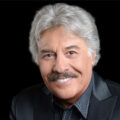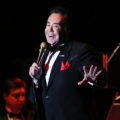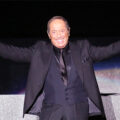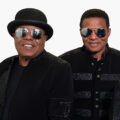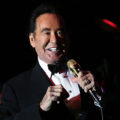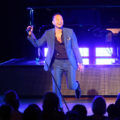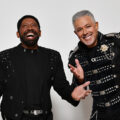“Mr. Las Vegas” Wayne Newton Hard Rock-ready, replays words of wisdom from Sinatra, Lucy
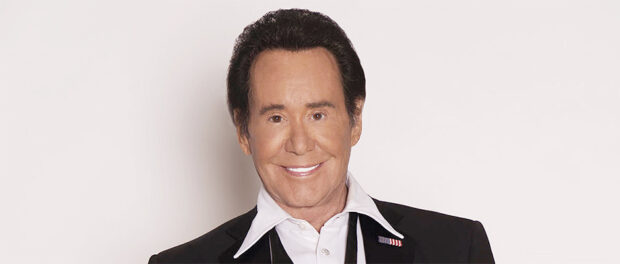 Photo provided by Hard Rock Live
Photo provided by Hard Rock Live
Showbiz has never been the same since Wayne Newton stepped on stage in the 1950s as a mere child, and even at 81-years-old, “Mr. Las Vegas” is as active of an entertainer extraordinaire as ever.
The man who was mentored by Frank Sinatra and Elvis Presley while starting out in that very city has since become its longest-running headliner ever, who played a pivotal role in paving the way for artist residencies as they’re known today.
And every so often, the veteran breaks away for a few shows on the road, including one with lifelong friend and fellow legend Tony Orlando at the Hard Rock Live Northern Indiana on Saturday, May 13.
With that on the horizon, Chicago Concert Reviews was honored to receive a call from the man behind “Danke Schoen” (as featured in “Ferris Bueller’s Day Off”), “Daddy, Don’t You Walk So Fast,” “Red Roses For A Blue Lady” and so many more standards, who was as kind as they come when he outlined how to achieve such longevity, thanks in part to some life-changing advice from both the “Chairman of the Board” and Lucille Ball.
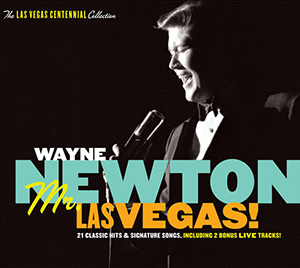 What’s in store for this special show?
What’s in store for this special show?
Wayne Newton: Well, it is a special show because Tony and I have worked together many times in the past, mostly in Branson, Missouri, but this show is different in that Tony will be doing his thing, I’ll be doing mine and then we’re discussing what we’re gonna do together during this show. We’re both looking forward with a great deal of anticipation…How do you like this, get ready, Tony and I celebrate the same day birthday, so I’m 21 and I don’t know how old he is (laughs).
What’s your recipe for staying so healthy and active? Or is simply staying active the secret?
Newton: I think so and I think that I went through a growth process having come to Las Vegas at 15-years-old. I saw the partyers. I saw the people who stayed out all night and then tried to do a show the next day, but I never got into that. When I’m working, I eat, sleep and work, so I think that has kept me healthy. I think it’s kept me really on a good line that keeps me focused. I understand what it is that’s expected of me and what it is I have to deliver.
When you were starting out, what was it like being mentored by the likes of Frank Sinatra and Elvis Presley?
Newton: The truth of the matter is until you look back at something in retrospect, you can’t really determine how important that was in your life and your career. You become friends with these people and you learn from them, not necessarily in terms of them sitting you down and saying, “Well, don’t do that,” or “do more of this,” or “do that.” You learn from just being around ‘em and it was true with Frank, and it was true of Elvis, and Bobby Darin, and Jack Benny, and Lucille Ball, and all those people that I had great friendships with. To learn from them without it being obvious was so important, you know? They befriended me. They didn’t judge me. I didn’t judge them. I think that people think that during those years, particularly in Las Vegas, that it was a very competitive situation between performers, which is exactly the antithesis of that. Those people, when they became friends of yours, they were friends of yours and being competitive is not something that ever even crossed their mind or my mind.
You rank right up there in the history books and have even been given several notable nicknames, such as “Mr. Las Vegas.” How did those come about?
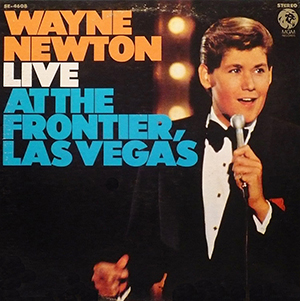 Newton: Some of them came about, like “The Midnight Idol” I was called for a while, [after] a reviewer came in to see the show at the Frontier, which no longer exists. He wrote an article that went nationwide and he ended the article with, “If Frank Sinatra is ‘The Matinee Idol,’ then surely Wayne Newton must be ‘The Midnight Idol.’” And everybody caught on to that and carried it on. The ‘Mr. Las Vegas’ thing, I have no idea how that happened, other than the fact that I wouldn’t leave Las Vegas (laughs), so maybe the fact that I wouldn’t leave made it a little easier for that to happen. But it’s funny because I can go places now when we’re on the road and they don’t even say, “Wayne Newton.” They say, “Mr. Las Vegas” appearing at such and such. And so with that came, of course, a tremendous responsibility, and that’s one that I recognize and do my best to live up to.
Newton: Some of them came about, like “The Midnight Idol” I was called for a while, [after] a reviewer came in to see the show at the Frontier, which no longer exists. He wrote an article that went nationwide and he ended the article with, “If Frank Sinatra is ‘The Matinee Idol,’ then surely Wayne Newton must be ‘The Midnight Idol.’” And everybody caught on to that and carried it on. The ‘Mr. Las Vegas’ thing, I have no idea how that happened, other than the fact that I wouldn’t leave Las Vegas (laughs), so maybe the fact that I wouldn’t leave made it a little easier for that to happen. But it’s funny because I can go places now when we’re on the road and they don’t even say, “Wayne Newton.” They say, “Mr. Las Vegas” appearing at such and such. And so with that came, of course, a tremendous responsibility, and that’s one that I recognize and do my best to live up to.
In what ways have you paved the way for Las Vegas residencies as we know them today?
Newton: I think that probably I had something to do with that. I would like to think that I did, because when I came here in 1959, one could not do a television [show] from Las Vegas because of the image of Vegas and then I watched the town go through the changes. When I got here, it was star policy with Dean [Martin], Frank, Sammy [Davis Jr.], Bobby Darin, Nat [King] Cole and on, and on, and on. That lasted about ten years and the town then went through impressionists that came to town that were doing impressions of the stars. That lasted about ten years and then the next evolution of how the town was changing turned into the production shows with dancers and those kind of things. Then we went to the magician era and then finally have come back to star policy again. Some of the performers are now happy with the fact that they’re playing longer runs at the hotel, not necessarily to the extent that I have, but like maybe a month at a time, and then come back six months later and do another month, that kind of thing. That is something that is going on now and I like to think it’s a great thing for our city.
What attracted you to stay in the city this whole time?
Newton: What happened is I auditioned at Fremont Hotel downtown when I was 15-years-old and they had to get a special permit for me to work because I wasn’t 21, so that turned into a five-year engagement of six shows a night, six nights a week. Then when I moved into main rooms after having a hit record or two, and having done some television and that kind of thing, we got hit with two shows a night seven nights a week. And I actually did one run when I was working for Howard Hughes between the Frontier, the Sands and the Desert Inn. He owned all three hotels. I did one run of 35 weeks without a day off (laughs), so it’s the things you learn and you must do to stay up with what’s happening.
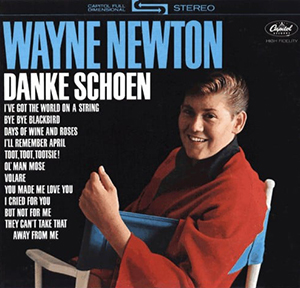 Does anything come to mind when you have a chance to break away for a concert on the road, specifically in the Midwest?
Does anything come to mind when you have a chance to break away for a concert on the road, specifically in the Midwest?
Newton: I love ‘em and I’ll tell you why. When I get the chance to come to a city, like the Hard Rock in Gary and any of the places that I play from out of town, the one thing that is constant with all of those, and particularly the Midwest, is that the audiences have one thing in common before they get to your show. They’re all basically from the same area, so they basically like the same things and dislike the same things, which is not true of a Las Vegas audience, because when you walk out to a Las Vegas audience, everybody in that crowd could be from any place in the world. The one thing they have in common is they have nothing in common with the people sitting next to them. So it’s a little harder to reach that crowd and find out, “Okay, what is it you like and don’t like?” So it becomes easier to perform in places on the road then it does even at home.
What are the iconic songs guaranteed to be in the set?
Newton: That’s not an easy question for me, only to the extent that to date I have recorded over 165 albums and over 200 singles, but the four songs I picked for the show now that I’m doing is “Danke Schoen,” “Red Roses For A Blue Lady,” “Summer Wind” and “Daddy, Don’t You Walk So Fast” because those were all hit records for me all across the world really. But what happens is, in years past, I would do an album and maybe the record company would release it in Australia first because I had another record released here at the time. When I took my wife to Australia for the first time, they were yelling for other songs, which my wife would say, “Why are they asking you to do that?” I said, “because those were hit songs for me here.” By the time I got home, there were other acts that had covered those songs from having heard them or seeing them register on the Top 20 in Australia, so they had hits on some of the songs that I had hits on when I was playing Australia…
I open every show with three different songs, and they are totally three different kind of songs. I’m sure that there are people who think that I’m doing that for other reasons then I am. The reason I’m doing that is because those three songs tell me where that crowd is that I’m performing for because they are totally different. One is a ballad, one is up-tempo, one would be rock and roll, and then another one would be maybe be a big band, middle of the road song. Watching the crowd’s reaction to those three or four tells me where the audience is and I’m able to gear my show to that.
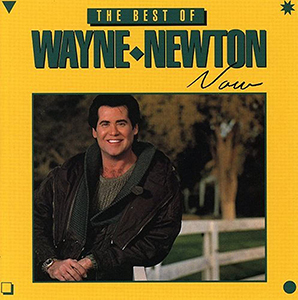 How did you learn 13 different instruments without the ability to read the notes?
How did you learn 13 different instruments without the ability to read the notes?
Newton: Well, I can’t read music at all (laughs). That developed from when I came to Las Vegas. My brother and I were a duo, and we were used to doing maybe one local TV show a week. Then we would do like a show here and there whenever one came up. When we got up here, they gave us a schedule and our schedule was six shows a night, six nights a week: 40 minutes on, 20 minutes off, 40 minutes on, 20 minutes off. Since I was the only singer between the two of us – we added a drummer and a bass player later – you can’t sing that much, so I kept developing the instruments in order to give me vocal relief and I ended up playing 13 different instruments now…
All self-taught to this day. If I see somebody playing something or doing something that I think I’d like to learn, it’s been very easy for me to learn that because I had perfect pitch, which I was born with. That’s a blessing at times in terms of learning things and songs, but it’s also a detriment to the extent that when I hear something go off key, whether I’m doing it or it could be a television commercial, it’s painful to me (laughs). I either turn it off if it’s television or leave the room, so it’s interesting the way that works.
Do you have any feelings about music and show business at the moment?
Newton: I love the music business and I love show business. I started singing in church when I was four. I had a local radio show, or a part of one, when I was five and most of that was country music. The first instrument that I learned to play was the steel guitar, and then when Elvis hit, there was no demand for steel guitar players, so I picked up the lead guitar and other instruments that would allow me to do the Elvis kind of music, which is what they wanted to hear in those years in the lounges. That’s how that evolution really kind of came about, not only in terms of musical instruments, but the kind of music you play on them, because as we moved into Las Vegas, people had to be 21-years-old in order to even be in the audience in those years. Some of them wanted a different kind of music, so I was really kind of forced to learn different types and find out what those types meant to me.
Now today, the real problem that I see, and this is not a negative, I think it’s a learning process. You see the television shows with singers on them competing against each other. They have judges and people who grade them, supposedly in how they sing and why they sing certain things. The truth of the matter is they are losing what that person has to offer by wanting them to sound like they sound.
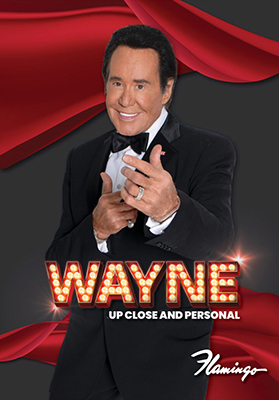 And I go back to a statement that was made at a luncheon many years ago with Frank Sinatra. He and I were having lunch together, and a singer, which for obvious reasons will not be named (laughs) came up to Frank and he handed Frank his brand new album. He said to Frank, “Boss, when you get a chance, listen to this and tell me what’s wrong with it.” And Frank didn’t even look up from his plate when he said, “I can tell you what’s wrong with it without listening to it.” The singer kind of blinked, as I did sitting across the table. Frank looked up at him and he said, “You know, God gave you an incredible instrument when He gave you your voice. Unfortunately, it’s not connected to your heart.” Those were words that have stuck with me my entire career.
And I go back to a statement that was made at a luncheon many years ago with Frank Sinatra. He and I were having lunch together, and a singer, which for obvious reasons will not be named (laughs) came up to Frank and he handed Frank his brand new album. He said to Frank, “Boss, when you get a chance, listen to this and tell me what’s wrong with it.” And Frank didn’t even look up from his plate when he said, “I can tell you what’s wrong with it without listening to it.” The singer kind of blinked, as I did sitting across the table. Frank looked up at him and he said, “You know, God gave you an incredible instrument when He gave you your voice. Unfortunately, it’s not connected to your heart.” Those were words that have stuck with me my entire career.
And think about it, when you see some of the young performers on television, they’re singing, “How many notes can you put in a bar? How many times can you do this?” instead of realizing that it’s gotta come from the heart. People have to feel like you feel like you’re singing about something that’s important.
You’ve had so many incredible encounters, can you share one more morsel of wisdom you’ve picked up along the way?
Newton: The other thing is that Lucy was a dear, dear friend to me and she said something one time in rehearsal to another performer who was on the same show that I was doing with her. This performer said, “Ms. Ball, what would you say was the most important thing that you’ve learned in your years in show business?” And she said, “There are two things that I can tell you that you must learn and you must accept. Number one, the road to happiness depends totally and completely on your ability to adjust” and the person kind of dropped their jaw at that. “What do you mean?” She said, “Life changes. Everything about life changes or there is no life, that’s it. So you must be able to adjust and carry your morals and principles with you. The second most important thing that I could tell any of you is ‘stay disciplined’ because if you don’t, you won’t accomplish anything” and those two things have stuck with me also.
Wayne Newton and Tony Orlando perform at Hard Rock Live Northern Indiana on Saturday, May 13. For additional details, visit WayneNewton.com, TonyOrlando.com and HardRockCasinoNorthernIndiana.com.

